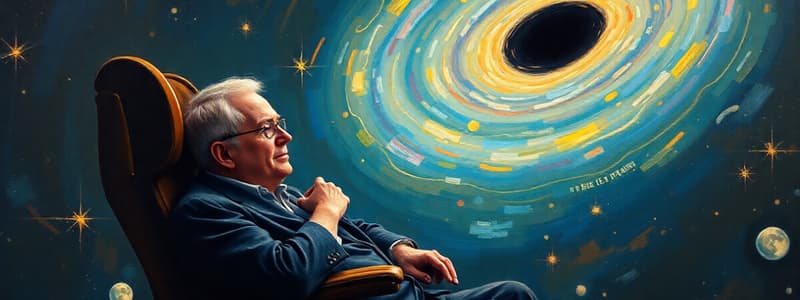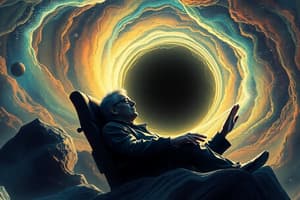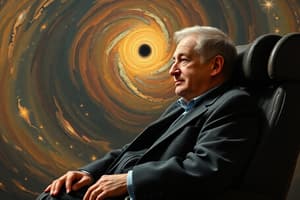Podcast
Questions and Answers
In what year did Stephen Hawking complete his doctoral thesis on the properties of expanding universes?
In what year did Stephen Hawking complete his doctoral thesis on the properties of expanding universes?
- 1966 (correct)
- 1970
- 1963
- 1974
Which prestigious academic position, once held by Isaac Newton, did Stephen Hawking attain?
Which prestigious academic position, once held by Isaac Newton, did Stephen Hawking attain?
- Professor of Astrophysics at Oxford
- Director of the Institute of Astronomy
- Lucasian Professor of Mathematics at Cambridge (correct)
- Head of the Royal Society
What did Stephen Hawking and Roger Penrose prove together regarding gravitational singularities?
What did Stephen Hawking and Roger Penrose prove together regarding gravitational singularities?
- That Einstein's general theory of relativity is incorrect
- That they eventually evaporate
- That they emit X-rays
- That singularities can exist (correct)
What did Hawking's work in 1974, using quantum theory, predict about black holes?
What did Hawking's work in 1974, using quantum theory, predict about black holes?
What was Stephen Hawking's primary area of study and research?
What was Stephen Hawking's primary area of study and research?
How did Stephen Hawking primarily communicate after the progression of his illness?
How did Stephen Hawking primarily communicate after the progression of his illness?
When was the term "black hole" coined?
When was the term "black hole" coined?
Which astronomical observations suggested a potential black hole's presence near star-forming areas in the Milky Way?
Which astronomical observations suggested a potential black hole's presence near star-forming areas in the Milky Way?
Regarding black holes, what did Hawking suggest could potentially occur in reverse?
Regarding black holes, what did Hawking suggest could potentially occur in reverse?
What was the primary aim of Hawking's book A Brief History of Time?
What was the primary aim of Hawking's book A Brief History of Time?
Flashcards
Stephen Hawking
Stephen Hawking
Renowned theoretical physicist known for work on black holes and the universe.
Hawking's contribution
Hawking's contribution
Used math to explore black holes and the universe's origins.
Black holes
Black holes
Regions in space where gravity is so strong nothing can escape.
Singularity
Singularity
Signup and view all the flashcards
A Brief History of Time
A Brief History of Time
Signup and view all the flashcards
ALS
ALS
Signup and view all the flashcards
Lucasian Professor
Lucasian Professor
Signup and view all the flashcards
Penrose's work
Penrose's work
Signup and view all the flashcards
Quantum theory and black holes
Quantum theory and black holes
Signup and view all the flashcards
X-ray binaries
X-ray binaries
Signup and view all the flashcards
Study Notes
Stephen Hawking
- Renowned theoretical physicist
- Used mathematics to understand "black holes" and the universe's origins
- Popularized science, enabling millions to comprehend space-time, gravity, and humanity's cosmic place
Hawking's Life
- Born in St. Albans, UK, in 1942
- Diagnosed with ALS in 1963 (motor neurone disease)
- Confined to a wheelchair from 1969
- Communicated via a computer-linked speech synthesizer, controlling it with facial muscles after losing vocal ability in 1985
Black Holes
- "Black hole" term coined in 1967
- German physicist Karl Schwarzschild hypothesized their existence earlier (1910s)
- Matter drawn into black holes creates X-rays
- 1964: Astronomers detected "X-ray binaries" near star-forming regions, suggesting the existence of possible black holes
- Hawking's fascination with black holes stemming from potential insights into the universe's origin
- Penrose's work (p.300) proved that a dying star's collapse can create a singularity (infinitely small and dense point in spacetime)
Hawking's Work and Recognition
- PhD thesis: Proposed that the universe's creation process could reverse
- 1974: Predicted that black holes emit heat (applying quantum theory)
- 1979: Became the Lucasian Professor of Mathematics at Cambridge University (a position previously held by Isaac Newton)
- 1988: Published A Brief History of Time which became a critical and commercial success, making his work more accessible
Studying That Suits You
Use AI to generate personalized quizzes and flashcards to suit your learning preferences.





